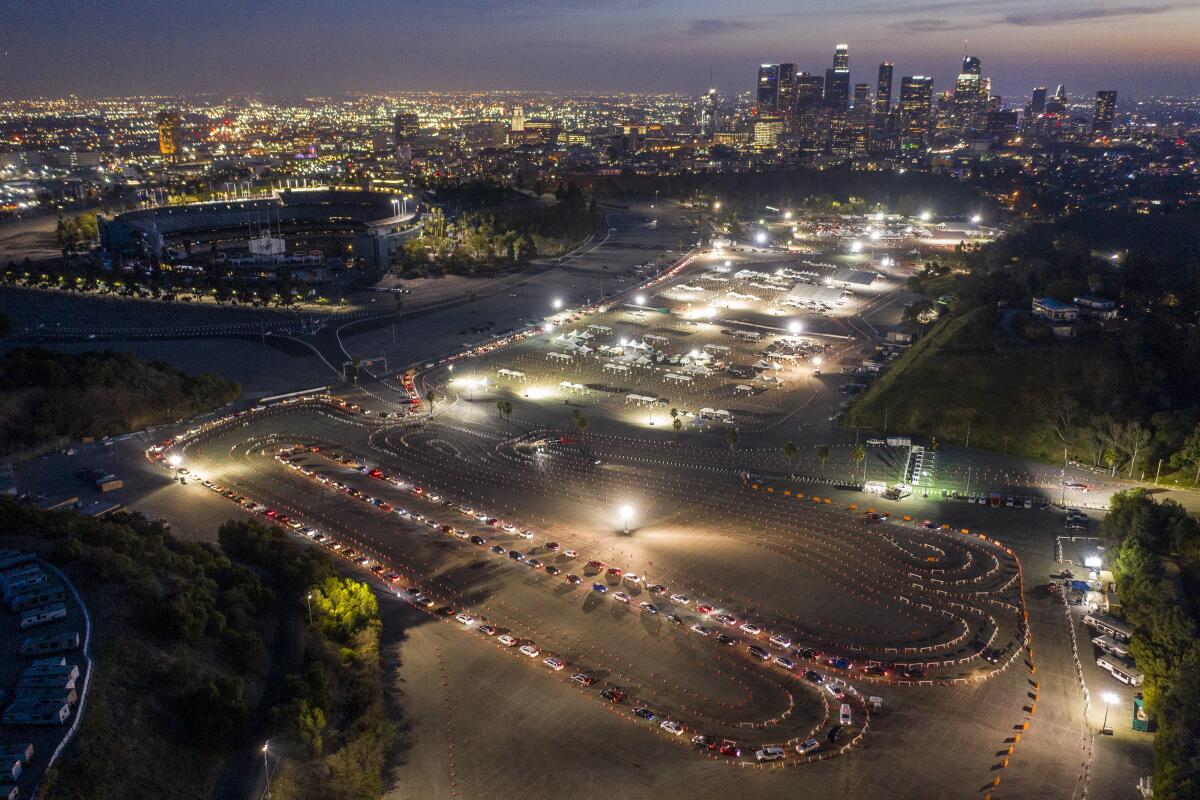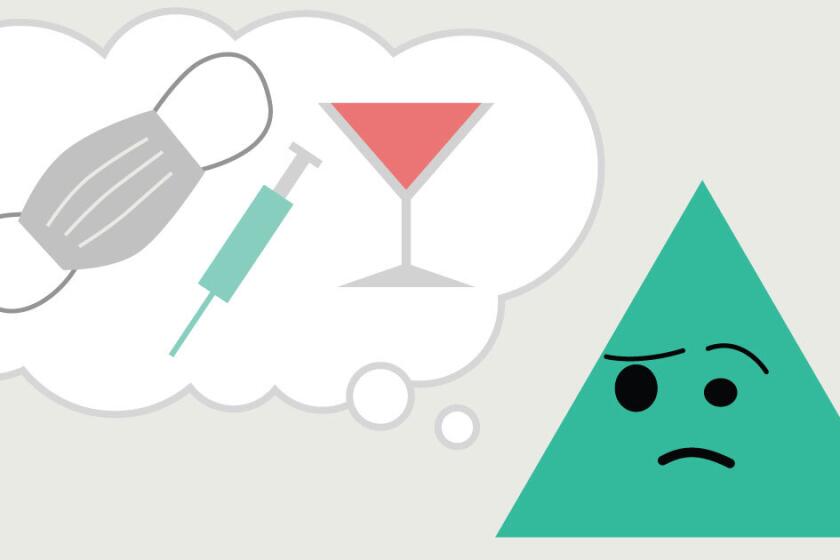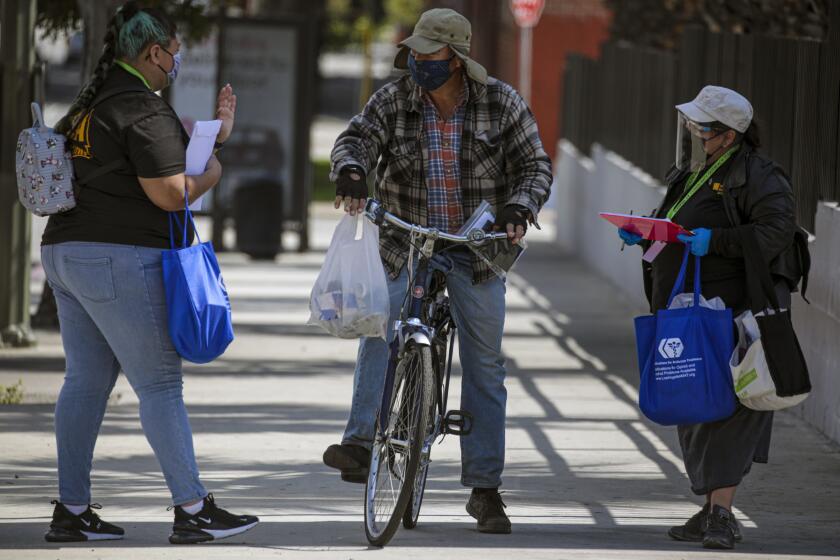Dodger Stadium vaccine site to close as demand slows

- Share via
In another sign of slowing demand for the COVID-19 vaccine, Los Angeles city officials announced on Friday that the mass vaccination site at Dodger Stadium — one of the largest in the country — will cease operations by the end of May, as part of a major shift to increase appointment-free vaccine availability at other city-run sites.
The pending closure comes amid a broader slowdown in demand across the region and country, a trend that is concerning public health officials. Appointments for the first dose of the COVID-19 vaccine have decreased by about 50% at Los Angeles County-run clinics, county health officials announced Thursday.
Deputy Mayor Jeff Gorell said the city has also seen a significant drop in appointment slots at city-run clinics, and that closing Dodger Stadium is aimed at dispersing access and availability at other city sites. Officials hope that a shift to this new system will mean that people unable to set a specific appointment time — due to work schedules, internet access or some other obstacle — will have more flexibility to get a shot.
“The process that will allow us to demobilize Dodger Stadium will allow us to maintain vaccine capacity and spread it out citywide,” Gorell said.
The city will begin to transition its vaccine clinics to an appointment-free system on Friday and Saturday, starting with Pierce College in Woodland Hills and in Lincoln Park. Cal State Los Angeles, Southwest College, USC, San Fernando Park and the 10 city-run mobile sites will follow suit next week as the hilltop drive-through site at Dodger Stadium progressively winds down operations. Vaccine supply and resources attached to Dodger Stadium will be redistributed elsewhere, including USC and other mobile clinics.
Residents will still be able to make appointments and keep existing appointments and expeditors will help facilitate the process for those who do. But an appointment slot will no longer be required.
County-run sites have already intermittently shifted to appointment-free operation over the last two weeks and will continue to do so through at least next week, L.A. County public health director Barbara Ferrer said as appointment slots have gone unfilled. She estimates there’s been about a 50% drop in first-dose appointments at all county sites.
“All of our sites will continue to just take anybody who shows up, even if they don’t have an appointment,” Ferrer said. “I think the strategy moving forward for all of us is going to be to make it as easy as possible for people to get vaccinated. And for some, that’s going to mean that we’re going to bring the vaccine close to where you already are at — if you’re at a shopping center; if you’re at a church or a mosque; if you’re at a school.”
The Dodger Stadium site, which previously served as the largest coronavirus testing site in the country, has been operated by the Los Angeles Fire Department and Sean Penn’s nonprofit CORE. It has accounted for the administration of more than 420,000 doses in the county, where, according to a Times analysis, more than 45% of residents have received at least one dose and more than 30% have been fully vaccinated.
The vaccine clinic hasn’t been without its problems. In late January, the CORE operation was criticized for its treatment of staff over testing and vaccination operations, which at least one staff member said required employees to work 18-hour days, six days a week. And the Curative tests used at the site and elsewhere in L.A. came under scrutiny when the U.S. Food and Drug Administration cautioned that the tests might result in a false negative.
But throughout the pandemic, the palm-tree-lined site has served as one of the most popular destinations in L.A. County to get tested and vaccinated against the virus. Live music often greeted residents who at times waited hours in line for their turn at the home of the 2020 World Series champions.
The closure of the site and the shift in the city’s operations occur as L.A. County prepares to enter the least-restrictive yellow tier next week, clearing the way for most businesses to reopen indoor operations with modifications, just weeks before California reopens fully in June. The update also means that Dodger Stadium can host more fans for games — though Gorell said that the closure of the clinic was not tied to the reopening status.
“We were never in a position that we equated yellow to an eviction,” he said.
The city plans to deploy more resources to communities where high percentages of unvaccinated residents remain. The utilization of community outreach groups has been key to those efforts to connect and educate residents about the vaccine by way of an already established and trusted source.
“I think this is a good thing because it’s more accessible to the community at large,” said Margarita Alvarez-Gomez, executive director of Central City Neighborhood Partners — a community-based group that serves residents in the Westlake and Pico neighborhoods. The easier the access to the vaccine, the more likely a person will go forward in getting a dose, she said.
The move to close the site at Dodger Stadium means that such groups will become even more integral to the vaccine rollout, in reaching those who have so far deferred a shot.
“Access and equity remain our North Stars in the campaign to protect public health and get every Angeleno vaccinated — and the Dodgers have been extraordinary partners in helping us save lives,” Mayor Eric Garcetti said in a statement. “As we enter the next phase in our vaccination program, our city is prepared to bring doses to Angelenos and move us closer to the end of this pandemic.”
And while transmission of the virus remains low in California and vaccinations have increased, there is always a possibility that the tides will change. In such an event, Dodgers President Stan Kasten said, future use of the stadium isn’t off the table.
“If the community has a need, you can count on the Dodgers to be there,” he said.
More to Read
Sign up for Essential California
The most important California stories and recommendations in your inbox every morning.
You may occasionally receive promotional content from the Los Angeles Times.













